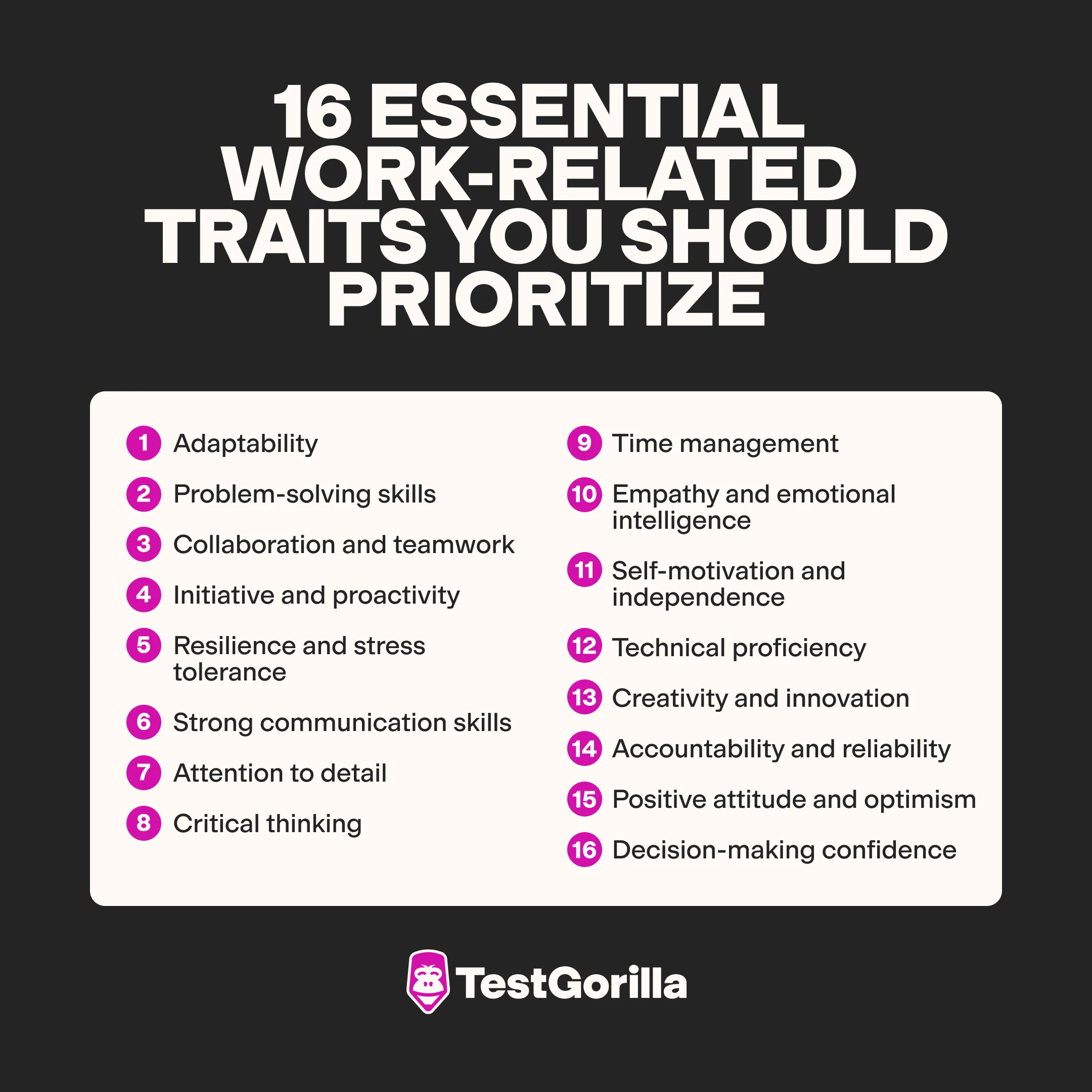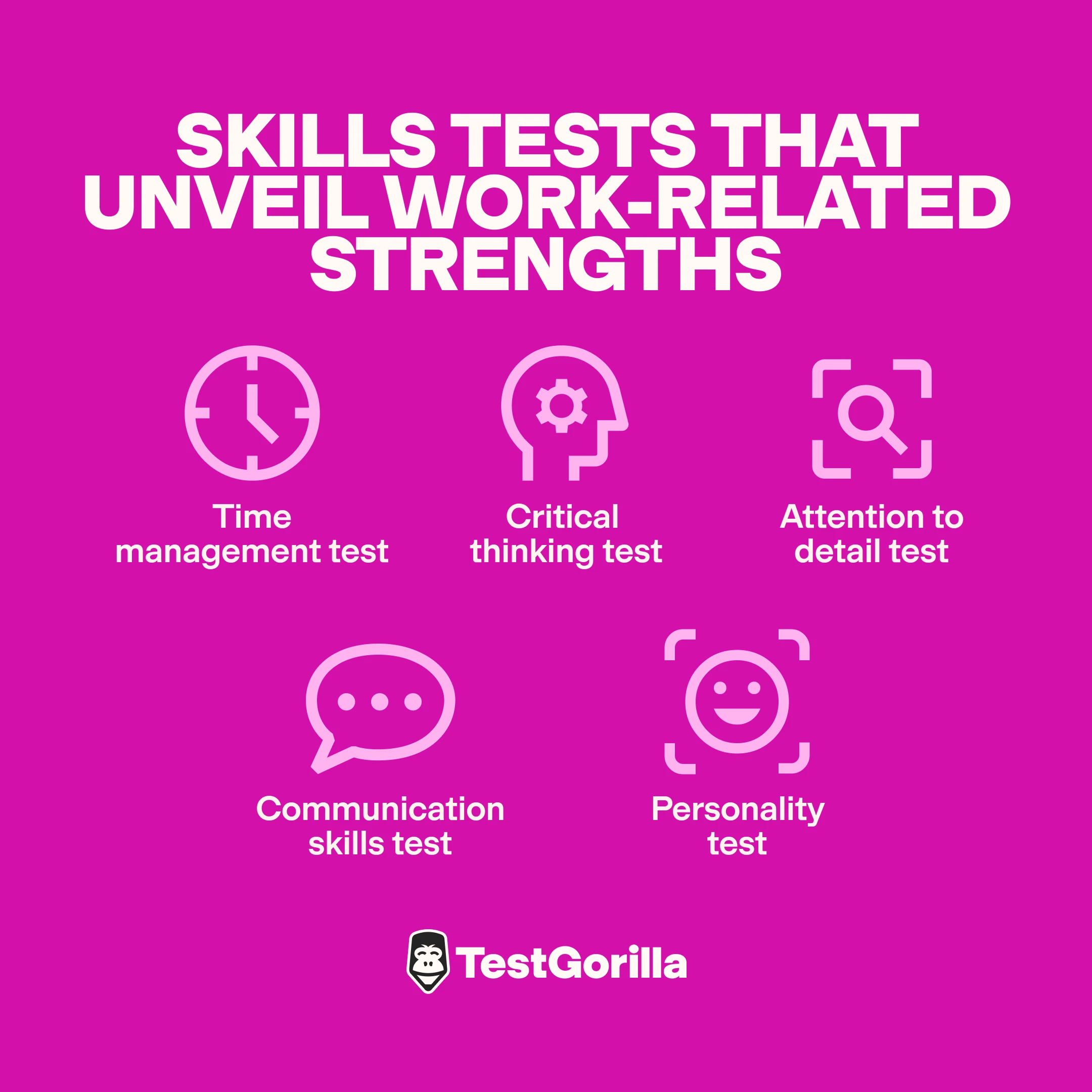16 essential work-related strengths to look for in the ideal candidate
Work-related strengths help candidates succeed across various roles. Know these strengths and how to spot them – and you can hire candidates with the best chance to thrive on the job.
But amid endless resumes, gut-feel interviews, and worries about mis-hiring, identifying the right strengths in candidates is no easy task.
In this guide, we break down the must-have work-related strengths to look for. You’ll also learn how to spot these strengths to shortlist interview-ready candidates.
Key takeaways
Hiring candidates with the right strengths helps guarantee that they’ll perform well on the job, stay engaged, and contribute to your company’s success.
The top work-related strengths include adaptability, problem-solving, collaboration, proactivity, and stress tolerance.
Find candidates with these skills by using a mix of talent assessments and structured interviews.
Why work-related strengths matter in hiring
Candidates with the right work-related strengths are more engaged, loyal, and better performing – leading to lower turnover and stronger team cohesion. They tend to need less training time and oversight on the job.
Companies, in turn, benefit from hiring employees who can wear multiple hats, go with the flow, think outside the box, and endure tough situations with smiles on their faces. These employees drive organizational success despite changing business environments.
16 essential work-related strengths you should look for
Here are the traits you should prioritize in candidates to start leveling up your hiring.
1. Adaptability
In today’s fast-paced workplaces, you should hire adaptable employees who can handle change and ambiguity. They can pivot when they need to, manage shifting priorities, and adjust to evolving company needs and market conditions.
2. Problem-solving skills
No role is problem-free, so problem-solving skills in the workplace are so important.
The best candidates assess situations quickly, think critically, and make decisions effectively, preventing workflow bottlenecks and supporting team goals. People who contribute solutions – instead of solely relying on guidance – are the people who ultimately drive a business forward.
3. Collaboration and teamwork
With the rise of remote and hybrid work, collaboration skills are no longer nice-to-have but essential. Candidates with strong collaboration skills communicate effectively, share responsibilities, and build strong working relationships. Team members with these skills support better dynamics and more accountability – and they’re especially helpful for projects that need collective input.
4. Initiative and proactivity
Candidates with initiative don’t wait to be told what to do: They recognize opportunities and act on them. Proactive people contribute to innovation by suggesting improvements, troubleshooting early, and propelling teams forward without constant oversight. This is critical for roles requiring a high degree of self-motivation and foresight.
5. Resilience and stress tolerance
Resilience is the ability to remain calm, composed, and focused in high-stress situations. Resilient candidates navigate setbacks without losing motivation or letting their work quality dip. Workplaces that champion resilience benefit from stable environments with minimal disruption to productivity.
6. Strong communication skills
Candidates with strong verbal and written communication skills convey ideas clearly, collaborate without misunderstandings, and reduce the risk of miscommunication-based errors. This benefits both clients and teams, reducing inefficiencies that result from poor communication.
7. Attention to detail
Detail-oriented candidates catch errors before they escalate, produce accurate work, and follow through on tasks thoroughly. Fields and roles involving complex tasks or precise data handling – like finance, legal, and technical positions – rely on candidates with this skill to deliver consistent, high-quality results.
8. Critical thinking
Candidates who can analyze situations objectively, consider multiple perspectives, and make well-reasoned decisions are a boon to any company. Critical thinkers are invaluable for roles that require complex problem-solving and strategic planning – such as project managers and department heads within professional services firms.
9. Time management
People with excellent time management skills can prioritize tasks, meet deadlines, and maintain productivity to maintain the most efficient workflows. They can balance workload demands and avoid burnout – even when handling multiple responsibilities or working under tight deadlines.
10. Empathy and emotional intelligence
People need empathy to build rapport, foster positive team environments, and reduce conflicts – it’s an antidote to negative work environments.
Emotionally intelligent workers – who can manage their own emotions and others’ – are better at handling interpersonal issues and constructively responding to feedback, making them invaluable in roles requiring lots of teamwork or customer interactions – like customer service (CS) roles.
11. Self-motivation and independence
Self-motivated employees take ownership of their work and pursue tasks without needing constant direction. People with this strength tend to thrive best in roles that require self-direction and accountability – especially in today’s many remote-first work environments.
12. Technical proficiency
Technical skills matter a great deal for specific roles – even those beyond traditional “technical” roles like programming. CS roles, for example, may use specific software to carry out the job effectively.
Candidates with strong technical proficiency can learn new tech quickly, reduce your training costs, perform tasks quickly, and keep your workflows efficient.
13. Creativity and innovation
Imaginative candidates bring fresh ideas to the table that improve the business – and can envision new ways to solve problems. These interrelated skills are highly valuable in dynamic environments where staying ahead of the competition is critical.
14. Accountability and reliability
Accountable employees accept responsibility for their actions and reliably follow through on commitments. Candidates who exhibit these traits build trust within teams, support consistent performance, and minimize disruptions caused by incomplete or delayed work.
15. Positive attitude and optimism
Positive people promote constructive work environments and help teams navigate challenges by motivating those around them. Optimistic mindsets help people handle setbacks gracefully and contribute to a productive, enjoyable work culture. Candidates with positive attitudes also tend to be more trainable.
16. Decision-making confidence
Confident decision-makers evaluate information, make choices quickly, and handle outcomes responsibly. People with this skill support company goals and reduce the hesitation that often leads to slower, less reactive teams and companies missing business opportunities.
💡 Pro tip: The strengths you should prioritize will depend on your workplace dynamics. For instance, workspaces with rigid structures and strict hierarchies might not value proactivity as much as others, as some forms of initiative could be seen as “stepping on the toes” of authority figures.
The best insights on HR and recruitment, delivered to your inbox.
Biweekly updates. No spam. Unsubscribe any time.
3 work-related weaknesses and their consequences
Each of the above strengths has a corresponding weakness. Take a peek at the three examples below.
Inflexibility and resistance to change: Rigid candidates who are resistant to change can struggle with new technologies and processes.
Lack of initiative, procrastination, and over-reliance on supervision: Some people need constant guidance to perform at their best, making for inefficient workflows. This is kryptonite to fast-paced and remote settings where autonomy is key. Plus, procrastination and lack of initiative hinder productivity and delay project timelines.
Weak time management: Ineffective time management often leads to missed deadlines, task overload, and reduced productivity. This weakness can impact roles requiring multitasking or quick turnaround times.
So, should you not hire candidates with the above weaknesses? Not necessarily. Some weaknesses – like bad time management – can be improved with the right training.
In fact, with the right training and encouragement, you can also bring out your new hires’ hidden strengths.
That’s why it’s important to consider candidates holistically by thinking about all their strengths, areas for improvement, and potential.
How to spot candidates with the work-related strengths you need
Traditional hiring methods like resumes and unstructured interviews don’t always give you insight into your candidates’ strengths, weaknesses, or potential. That's where TestGorilla comes in.
Our talent discovery platform offers a full test library – covering soft skills, technical skills, cognitive abilities, situational judgment, personality, and more. You can include up to five tests in one assessment, which you can use to objectively measure candidates’ adaptability, proactivity, accountability, creativity, and more.
Here are just some of the tests we offer that might be useful for unveiling your candidates’ work-related strengths:
By using assessments early in your hiring process – for instance, when you initially screen applicants – you gain valuable data on how candidates will perform in real-world scenarios. Then, you can shortlist the candidates who demonstrate the strengths you need.
After that, you can use other evaluative methods – like structured interviews – to learn more about the strengths and weaknesses of your shortlisted candidates. For instance, say you want to probe your candidates’ decision-making confidence. You might ask them, “Describe a time when you had to make a quick decision with limited information. What was the situation, and what was the outcome?”
Hire strong candidates with talent assessments
Candidates equipped with the right work-related strengths are capable of excelling in their positions. Strengths like emotional intelligence, reliability, and optimism can be the difference between a great hire and an okay one.
TestGorilla helps you identify essential strengths in a way that’s fair, unbiased, and data-driven.
Want to see how TestGorilla can revolutionize your recruitment? Sign up for a free trial today or schedule a demo.
FAQs
1. What is a professional strength?
Professional strengths are skills and abilities that are valuable in the workplace, like technical expertise and effective communication skills.
2. What are the top 3 work-related strengths?
Three of the top work-related employee strengths are adaptability, problem-solving, and collaboration and teamwork skills.
3. How can you identify employee strengths?
You can identify strengths in your own employees by closely observing their job performance and the areas they tend to excel in. You can use various other methods to discover other or hidden strengths, too, including 360-degree feedback, performance reviews, and targeted skill assessments.
You've scrolled this far
Why not try TestGorilla for free, and see what happens when you put skills first.
















